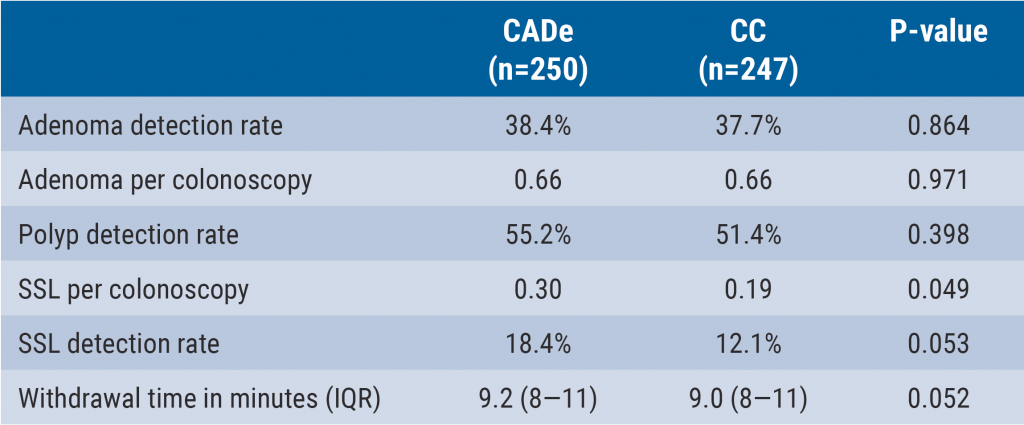https://doi.org/10.55788/b27ed926
“New oral treatments with novel mechanisms of action are needed to treat patients with UC,” expressed Prof. Séverine Vermeire (UZ Leuven, Belgium). “The investigational agent obefazimod evokes an enhanced expression of miR-124, resulting in a reduction of pro-inflammatory cytokines.” Obefazimod has demonstrated encouraging efficacy and safety data after 8 weeks of induction therapy in participants with UC in a phase 2b study [1]. All participants who completed the phase 2b study could then enrol in the open-label, 96-week maintenance study, irrespective of their clinical response. Prof. Vermeire presented the current findings of the open-label study [2]. Clinical remission was based on the Modified Mayo score (MMS) and defined as a stool frequency subscore ≤1, rectal bleeding subscore (RBS)=0, and an endoscopic subscore ≤1. Clinical response was defined as a decrease in the MMS ≥2 points and ≥30% from baseline, plus a decrease in RBS ≥1 or an absolute RBS ≤1. Endoscopic remission and improvement were assessed as endoscopic subscores of 0 and ≤1, respectively. The 217 participants received 50 mg of obefazimod once daily, orally administered. “Over 90% of these participants had been exposed to 2 or more biologic therapies and/or JAK inhibitors,” she stressed.
The clinical remission rates at weeks 48 and 96 were 54.8% and 52.5%, respectively. Other outcomes displayed promising efficacy results for obefazimod as well: at weeks 48 and 96, clinical response rates were 82% and 72.8%, respectively; endoscopic improvement rates were 61.3% and 59%; and endoscopic remission rates were 33.2% and 35.9%.
In bio-naïve participants, the corresponding rates of efficacy outcomes were 63.8% for the clinical remission rate, 77.3% for the clinical response rate, 68.9% for the endoscopic improvement rate, and 48.7% for the endoscopic remission rate. For bio-experienced participants, the rates were numerically lower but still promising, according to Prof. Vermeire, with 38.8%, 67.3%, 46.9%, and 20.4%, respectively (see Figure). She added that 48.2% of the participants who were not in clinical remission at baseline (n=168) achieved clinical remission at 2 years of therapy.
Figure: Efficacy results in bio-naïve and bio-refractory participants at 2 years [2]

Treatment-emergent adverse events (TEAEs) were reported in 68.7% of the participants over the 2-year course of the study. COVID-19 (14.3%), headache (11.5%), and UC worsening (7.8%) were the most common TEAEs. Nearly 8% of participants had TEAEs leading to study discontinuation. Finally, serious AEs occurred in 8.7% of the participants, including a wide variation of events from which no concerning pattern could be distilled.
“At week 96, obefazimod showed promising safety and efficacy results in participants with UC. The agent is currently being investigated in phase 3 trials,” concluded Prof. Vermeire.
- Vermeire S, et al. Lancet Gastroenterol Hepatol. 2022;7:1024–-1035.
- Vermeire S, et al. Obefazimod in patients with moderate-to-severe ulcerative colitis: efficacy and safety analysis from the 96-week open-label maintenance phase 2b study. OP077, UEG Week 2023, 14–17 October, Copenhagen, Denmark.
Copyright ©2023 Medicom Medical Publishers
Posted on
Previous Article
« Rapid response to upadacitinib boosts outcomes in severe Crohn’s disease Next Article
Risankizumab resolves extraintestinal manifestations in CD »
« Rapid response to upadacitinib boosts outcomes in severe Crohn’s disease Next Article
Risankizumab resolves extraintestinal manifestations in CD »
Table of Contents: UEGW 2023
Featured articles
SEQUENCE: Risankizumab doubles endoscopic remission rates compared with ustekinumab in CD
What’s New in Artificial Intelligence
Digital intervention relieves symptoms and improves QoL in IBS
GastroGPT: Successful proof-of-concept study of gastroenterology-specific large language model
Other Therapeutics and Outcomes
Primary results from MAESTRO-NASH trial: resmetirom efficacious for NASH
Apraglutide: Advancing the treatment of short bowel syndrome
Endobiliary radiofrequency ablation in pCCA: a pilot study
Raising awareness for microscopic colitis: disease course and predictors
Outcomes of IBD Trials
DIVERSITY1: Filgotinib results in Crohn’s disease leave investigators puzzled
SEQUENCE: Risankizumab doubles endoscopic remission rates compared with ustekinumab in CD
Guselkumab provides benefits in UC regardless of advanced therapy history
INSPIRE: Risankizumab meets all efficacy endpoints in UC
Risankizumab resolves extraintestinal manifestations in CD
Obefazimod takes the spotlight as promising UC treatment
Rapid response to upadacitinib boosts outcomes in severe Crohn’s disease
LUCENT trials: Mirikizumab works in UC, regardless of targeted therapy history
ARTEMIS-UC: New kid in town for UC
Breakthroughs in Colorectal Lesions
Safer removal of large polyps with cold snare technique
Higher recurrence rates with cold snare EMR than with conventional EMR
How to deal with at-risk patients above the CRC screening age limit?
European CRC screening needs to be revised
Advances in Upper Endoscopy and Colonoscopy
Epinephrine boosts efficiency in gastric ESD
Artificial intelligence-aided colonoscopy did not improve outcomes in Lynch syndrome
Can computer technology improve our everyday colonoscopy results?
Is AI-assisted colonoscopy ready for clinical practice?
Should we use E-SEMS or EVT for traumatic oesophageal perforations?
Related Articles

December 7, 2023
Can computer technology improve our everyday colonoscopy results?
December 7, 2023
Is AI-assisted colonoscopy ready for clinical practice?
© 2024 Medicom Medical Publishers. All rights reserved. Terms and Conditions | Privacy Policy

